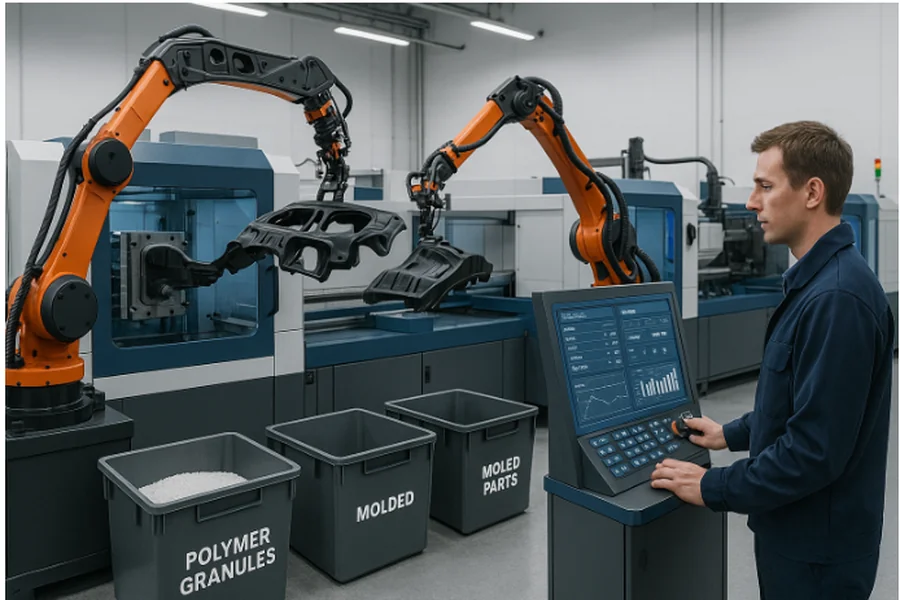In today’s automotive industry, lightweight design is no longer a trend—it’s a necessity. Driven by the need for fuel efficiency, lower emissions, and improved vehicle performance, automakers are turning to advanced materials and manufacturing methods to reduce weight without compromising strength or durability. Among the most effective methods supporting this shift is custom injection molding, which allows manufacturers to produce complex, high-precision plastic parts that meet strict performance and aesthetic requirements. As part of this process, custom mold making and plastic molding services play a vital role in delivering tailored, lightweight solutions at scale.
Why Lightweighting Matters in Automotive Design
Lightweighting helps automakers meet regulatory standards while also improving acceleration, handling, and fuel economy. According to the U.S. Department of Energy, reducing a vehicle’s weight by just 10% can improve fuel economy by 6–8%. In electric vehicles (EVs), lighter weight directly translates to greater driving range—a critical advantage in today’s competitive market.
To achieve these targets, OEMs and suppliers have increasingly moved away from traditional metal components in favor of high-performance plastics. These engineered polymers can often provide the same strength as metal while weighing significantly less. However, to use these materials effectively, the manufacturing process must be equally precise—and that’s where custom injection molding comes in.
The Precision Advantage of Custom Injection Molding
Custom injection molding enables the creation of lightweight automotive parts with exact tolerances and repeatable quality. From dashboard components to under-the-hood parts, this method supports the production of complex geometries that are difficult or impossible to achieve with traditional fabrication methods.
The key benefit of custom injection molding lies in its ability to meet specific application needs. Automotive designers often require parts that can withstand extreme temperatures, vibrations, and chemical exposure—all while keeping weight to a minimum. By working with experienced plastic molding service providers, manufacturers can select the right material for the job, whether it’s glass-filled nylon for added stiffness or high-heat polyamide for engine components.
Applications in Lightweight Automotive Parts
Custom-molded plastic parts are already replacing metal in many areas of vehicle construction:
- Air intake manifolds: Once made from aluminum, these are now commonly injection molded from heat-resistant plastics.
- Interior panels and trim: Lightweight polymers reduce overall mass while offering aesthetic flexibility.
- Battery housings in EVs: Using plastics instead of metal can reduce weight and lower production costs.
- Cooling systems and fluid reservoirs: Molded plastics resist corrosion and reduce weight in engine compartments.
Each of these parts benefits from the versatility and design freedom that custom mold making enables. Manufacturers can eliminate unnecessary material, incorporate multiple functions into a single component, and optimize parts for both performance and cost.
Design Flexibility and Integration
One of the most underappreciated advantages of custom injection molding is the ability to integrate multiple components into a single part. This reduces the number of assembly steps, minimizes the use of fasteners, and contributes to further weight savings. For example, a custom-molded HVAC housing can incorporate air ducts, sensor mounts, and structural supports in one shot—cutting down on both weight and labor.
Designers can also take advantage of ribbing, hollow sections, and lattice structures to reinforce parts without adding bulk. These techniques are especially effective in structural interior components and underbody covers, where stiffness is important but weight must be kept low.
Long-Term Benefits for Automotive Manufacturers
By investing in custom mold making and using specialized plastic molding services, automotive manufacturers gain more than just lighter parts. They also benefit from shorter production cycles, lower tooling costs, and better consistency across high-volume runs. In a market that rewards speed, reliability, and innovation, these advantages can make a measurable difference.
As the industry continues to evolve—particularly with the rise of EVs and autonomous vehicles—custom injection molding will remain a cornerstone technology for creating lightweight, efficient, and high-performing vehicles.

